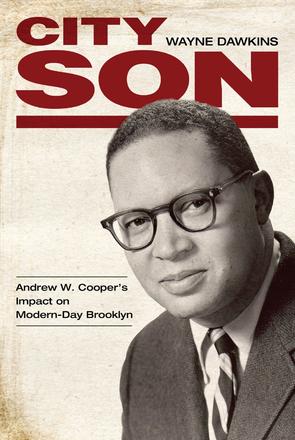
City Son
Andrew W. Cooper's Impact on Modern-Day Brooklyn
The story of an unforgettable African American journalist and his impact on New York City and America
Description
In 1966, a year after the Voting Rights Act began liberating millions of southern blacks, New Yorkers challenged a political system that weakened their voting power. Andrew W. Cooper (1927–2002), a beer company employee, sued state officials in a case called Cooper vs. Power. In 1968, the courts agreed that black citizens were denied the right to elect an authentic representative of their community. The 12th Congressional District was redrawn. Shirley Chisholm, a member of Cooper's political club, ran for the new seat and made history as the first black woman elected to Congress.
Cooper became a journalist, a political columnist, then founder of Trans Urban News Service and the City Sun, a feisty Brooklyn-based weekly that published from 1984 to 1996. Whether the stories were about Mayor Koch or Rev. Al Sharpton, Howard Beach or Crown Heights, Tawana Brawley's dubious rape allegations, the Daily News Four trial, or Spike Lee's filmmaking career, Cooper's City Sun commanded attention and moved officials and readers to action.
Cooper's leadership also gave Brooklyn—particularly predominantly black central Brooklyn—an identity. It is no accident that in the twenty-first century the borough crackles with energy. Cooper fought tirelessly for the community's vitality when it was virtually abandoned by the civic and business establishments in the mid-to-late twentieth century. In addition, scores of journalists trained by Cooper are keeping his spirit alive.
Reviews
"There's an old saying that behind every great man, you'll find a great woman. The reverse might be said in the case of Shirley Chisholm, who served in the US House of Representatives for the 12th District of New York and who was the first African American woman to be elected to that body. Chisholm's distinguished career and dedication to her community are well known, but how many today realize that it was a successful lawsuit brought by Brooklyn voting rights activist Andrew W. Cooper that ultimately opened the doors for Chisholm to make her move?
Wayne Dawkins devoted seven years to crafting a biography of Cooper, a former beer company employee whom he has called mentor. Dawkins documents the explosive times that helped forge a shift in the political landscape that reached well beyond the borders of Brooklyn, New York. "
- Dailypress.com
"Throughout the newspaper's abbreviated run of 1984–1996, Cooper, named ‘Journalist of The Year’ by the NABJ in 1987, kept his finger on the pulse of the city, culturally and politically, and on the world stage. Some of the writing talents on its staff are notable for their contributions elsewhere: Utrice C. Leid, Armond White, Hugh Hamilton, Errol Louis, Peter Noel, Anthony Carter Paige, and Simone Joye. . . . As a project started in 2005 upon request by Cooper's widow, Dawkins gives the reader an intimate, candid look at this remarkable man and his dedicated personal mission to speak truth at all costs. It's a first-class effort, revelatory, courageous, and satisfying. "
- African American Literary Book Club
"In City Son author Wayne Dawkins showcases fresh voices within the black Brooklyn community who helped deliver the 1965 mayoral election to John V. Lindsay."
- Milton Mollen, Lindsay associate, retired judge, and leader of the 1992–94 Mollen Commission investigation of police corruption
"With his new book, which revolves around the life and times of the late Andrew Cooper, the writer Wayne Dawkins keeps building an impressive résumé for using his talent for digging and research to shed light on what might be characterized as 'hidden history.' Mr. Dawkins, a professor in the Scripps Howard School of Journalism and Communications at Hampton University, is himself a native of Brooklyn and that's the piece of New York City that he draws on for this book. This is an important book for many reasons, but none greater than this: it is chock full of significant and compelling stories not told. This book brings some balance into the story of New York politics, and a part of what it reflects is the way that the contributions, ideas, and struggles of black New Yorkers are not just ignored but treated as though they never were. Some may ask, 'Who is Andrew Cooper?' This book by Professor Dawkins not only answers that in compelling detail, but it also raises this question, 'Why is it that this chunk of New York is a story not told?'"
- Earl Caldwell, host of The Caldwell Chronicle on WBAI and former journalist for The New York Times, New York Daily News, and The New York Amsterdam News